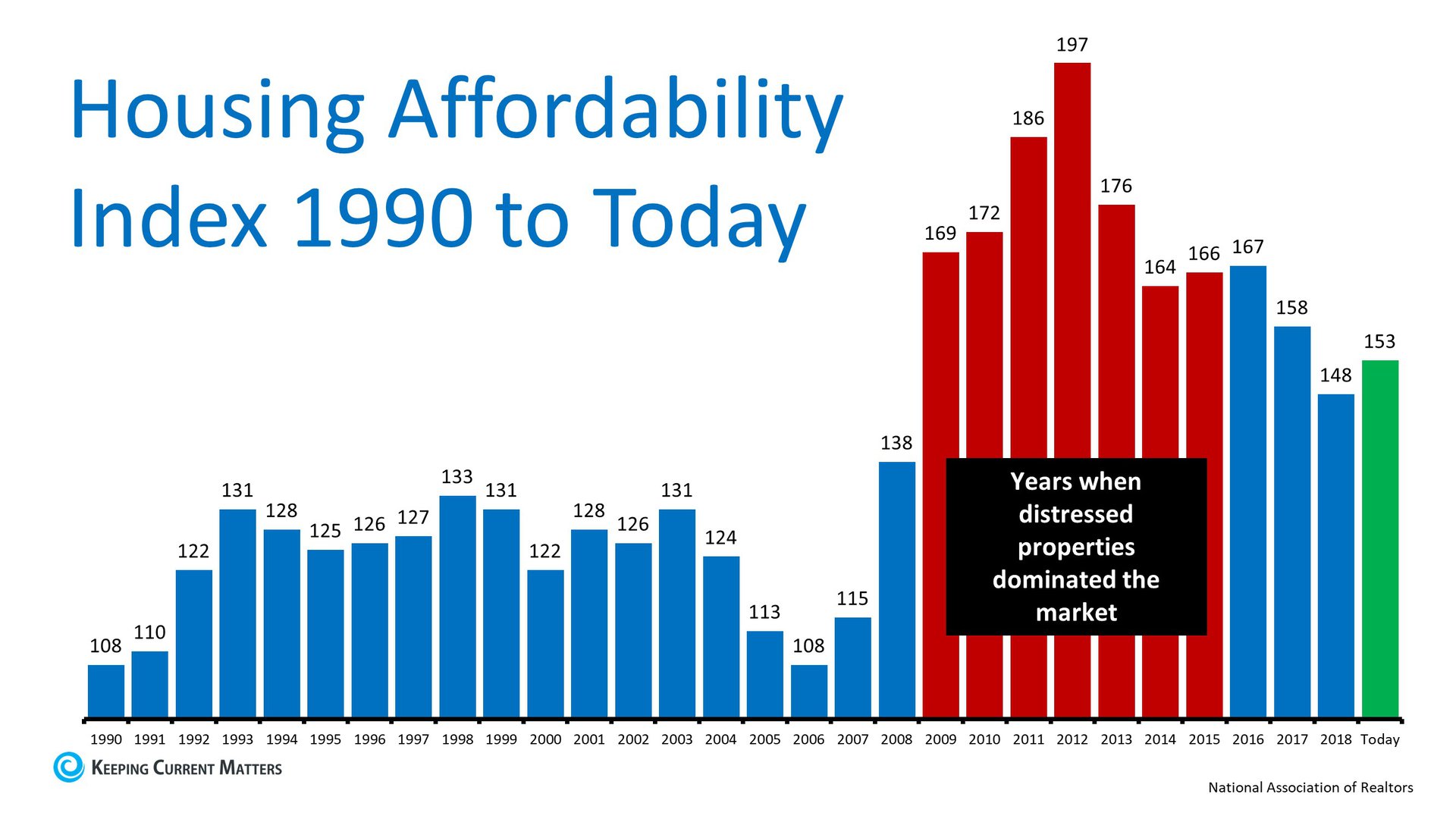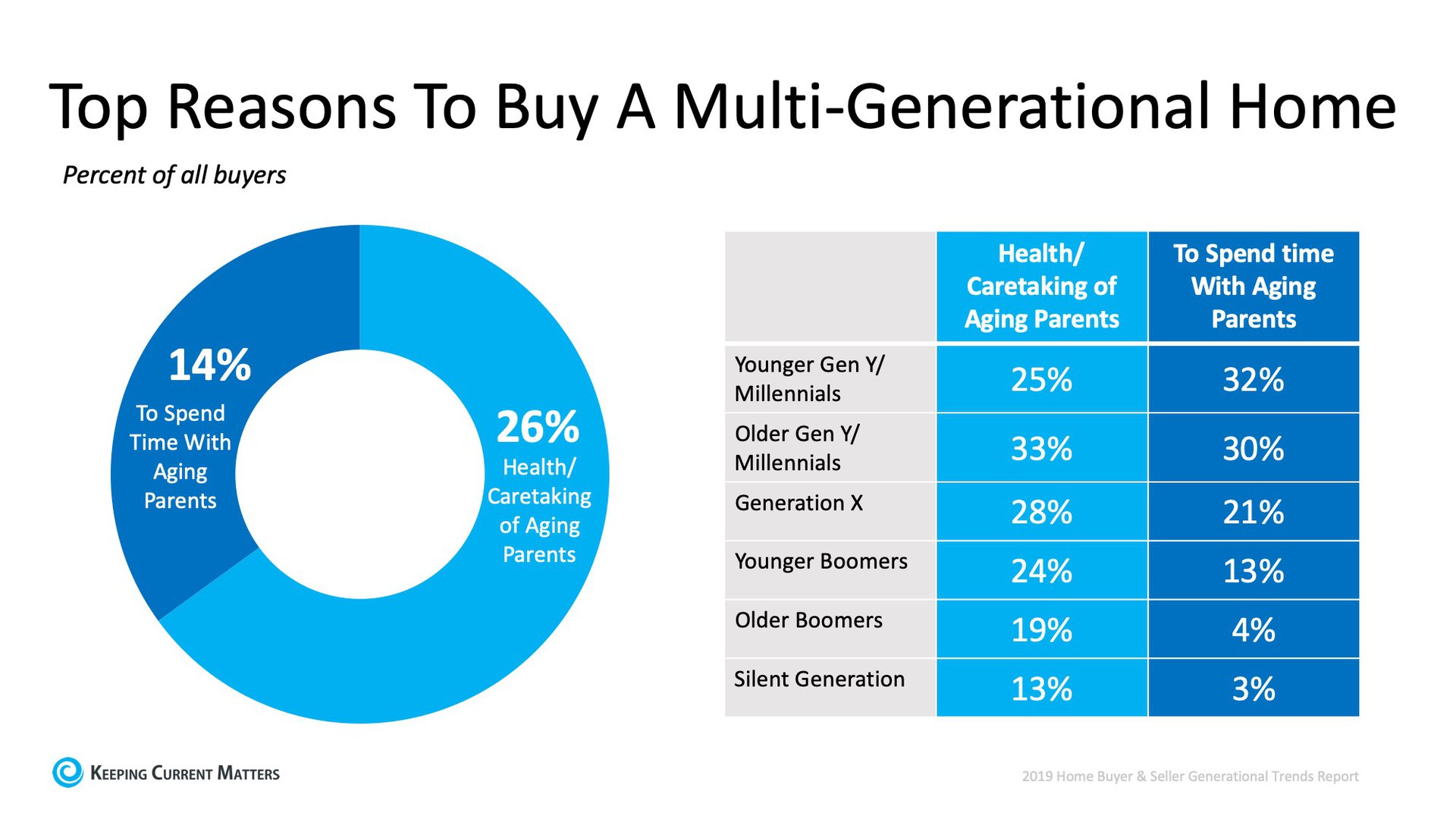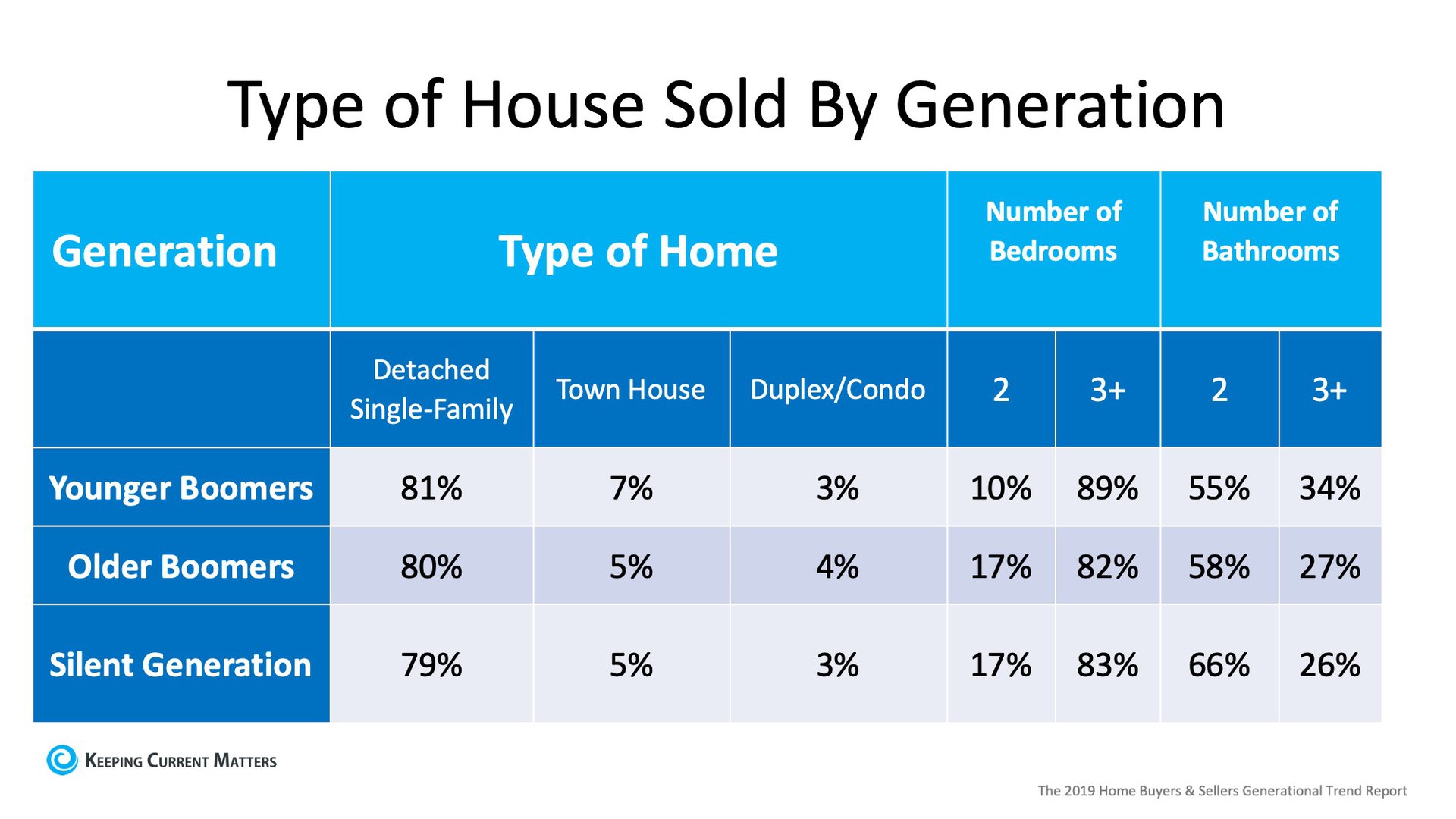
Sunday, June 30, 2019
Friday, June 28, 2019
Thursday, June 27, 2019
Tuesday, June 25, 2019
Monday, June 24, 2019
The Ultimate Truth about Housing Affordability
 There have been many headlines decrying an “affordability crisis” in the residential real estate market. While it is true that buying a home is less affordable than it had been over the last ten years, we need to understand why and what that means.
There have been many headlines decrying an “affordability crisis” in the residential real estate market. While it is true that buying a home is less affordable than it had been over the last ten years, we need to understand why and what that means.
On a monthly basis, the National Association of Realtors (NAR), produces a Housing Affordability Index. According to NAR, the index…
“…measures whether or not a typical family earns enough income to qualify for a mortgage loan on a typical home at the national and regional levels based on the most recent price and income data.”
Their methodology states:
“To interpret the indices, a value of 100 means that a family with the median income has exactly enough income to qualify for a mortgage on a median-priced home. An index above 100 signifies that family earning the median income has more than enough income to qualify for a mortgage loan on a median-priced home, assuming a 20 percent down payment.”
So, the higher the index, the more affordable it is to purchase a home. Here is a graph of the index going back to 1990:

It is true that the index is lower today than any year from 2009 to 2017. However, we must realize the main reason homes were more affordable. That period of time immediately followed a housing crash and there were large numbers of distressed properties (foreclosures and short sales). Those properties were sold at large discounts.
Today, the index is higher than any year from 1990 to 2008. Based on historic home affordability data, that means homes are more affordable right now than any other time besides the time following the housing crisis.
With mortgage rates remaining low and wages finally increasing, we can see that it is MORE AFFORDABLE to purchase a home today than it was last year!
Bottom Line
With wages increasing, price appreciation moderating, and mortgage rates remaining near all-time lows, purchasing a home is a great move based on historic affordability numbers.
Sunday, June 23, 2019
Saturday, June 22, 2019
Friday, June 21, 2019
Thursday, June 20, 2019
Wednesday, June 19, 2019
Starting the Search for Your Dream Home? Here Are 5 Tips!
 In today’s real estate market, low inventory dominates the conversation in many areas of the country. It can often be frustrating to be a first-time homebuyer if you aren’t prepared.
In today’s real estate market, low inventory dominates the conversation in many areas of the country. It can often be frustrating to be a first-time homebuyer if you aren’t prepared.
In a realtor.com article entitled, “How to Find Your Dream Home—Without Losing Your Mind,” the author highlights some steps that first-time homebuyers can take to help carry their excitement of buying a home throughout the whole process.
1. Get Pre-Approved for a Mortgage Before You Start Your Search
One way to show you are serious about buying your dream home is to get pre-qualified or pre-approvedfor a mortgage before starting your search. Even if you are in a market that is not as competitive, understanding your budget will give you the confidence of knowing whether or not your dream home is within your reach.
This step will also help you narrow your search based on your budget and won’t leave you disappointed if the home you tour, and love, ends up being outside your budget!
2. Know the Difference Between Your ‘Must-Haves’ and ‘Would-Like-To-Haves’
Do you really need that farmhouse sink in the kitchen to be happy with your home choice? Would a two-car garage be a convenience or a necessity? Could the ‘man cave’ of your dreams be a future renovation project instead of a make-or-break right now?
Before you start your search, list all the features of a home you would like and then qualify them as ‘must-haves’, ‘should-haves’, or ‘absolute-wish list’ items. This will help keep you focused on what’s most important.
3. Research and Choose a Neighborhood You Want to Live In
Every neighborhood has its own charm. Before you commit to a home based solely on the house itself, the article suggests test-driving the area. Make sure that the area meets your needs for “amenities, commute,school district, etc. and then spend a weekend exploring before you commit.”
4. Pick a House Style You Love and Stick to It
Evaluate your family’s needs and settle on a style of home that would best serve those needs. Just because you’ve narrowed your search to a zip code, doesn’t mean that you need to tour every listing in that zip code.
An example from the article says, “if you have several younger kids and don’t want your bedroom on a different level, steer clear of Cape Cod–style homes, which typically feature two or more bedrooms on the upper level and the master on the main.”
5. Document Your Home Visits
Once you start touring homes, the features of each individual home will start to blur together. The article suggests keeping your camera handy to document what you love and don’t love about each property you visit.
Making notes on the listing sheet as you tour the property will also help you remember what the photos mean, or what you were feeling while touring the home.
Bottom Line
In a high-paced, competitive environment, any advantage you can give yourself will help you on your path to buying your dream home.
Tuesday, June 18, 2019
Monday, June 17, 2019
Boomerang Buyers: Don't Be Afraid to Buy a Home Again!
 things necessary to learn that affect the ability to get the financing needed to purchase a home. Past occurrences can determine if there is a waiting period. In other words, you need to let your knees heal before you try again!
things necessary to learn that affect the ability to get the financing needed to purchase a home. Past occurrences can determine if there is a waiting period. In other words, you need to let your knees heal before you try again!
As we’ve mentioned in the past, homeownership has many financial and non-financial benefits. Each person needs to go over the pros and cons, taking the time to figure out what is best for their family. Should they continue renting, or should they try to buy again?
The good news is that some “boomerang buyers” are getting back into the market. They’re getting back on their bike!
“Of 2.8 million former homeowners whose foreclosures, short sales or bankruptcies dropped off their credit reports from January 2016 to November 2018, 11.5% have obtained a new mortgage, according to a study by credit rating agency Experian for USA Today.”
NerdWallet’s report also mentioned:
- 6% plan to buy a house this year.
- 39% intend to buy over the next 3 years.
- 58% say they will purchase within 5 years.
Bottom Line
If you lost a home due to a financial event but would like to review your options, contact a local real estate professional that can help you create a plan to obtain a home in the future!
Sunday, June 16, 2019
Saturday, June 15, 2019
Friday, June 14, 2019
The Impact Staging Your Home Has On Your Sale Price [INFOGRAPHIC]

Some Highlights:
- The National Association of Realtors surveyed their members & released the findings of their Profile of Home Staging.
- 62% of seller’s agents say that staging a home decreases the amount of time a home spends on the market.
- 50% of staged homes saw a 1-10% increase in dollar-value offers from buyers.
- 77% of buyer’s agents said staging made it easier for buyers to visualize the home as their own.
- The top rooms to stage in order to attract more buyers are the living room, master bedroom, kitchen, and dining room.
Wednesday, June 12, 2019
Are Older Generations Really Not Selling Their Homes?
 As we can see, they have plenty of reasons to sell their current home! But what type of homes are they trading in?
As we can see, they have plenty of reasons to sell their current home! But what type of homes are they trading in?
Once again, the report demonstrated that older generations are not keeping that 3-bedroom, 2-bath colonial home. Instead, they are putting it on the market and moving on with their lives!
Bottom Line
If you are living in a house that no longer fits your needs, contact a local real estate professional who can help you find a home that will!
Tuesday, June 11, 2019
Monday, June 10, 2019
Sunday, June 9, 2019
Friday, June 7, 2019
In honor of National Donut Day, I think you should go to Glazed Donut Bar in Whittier! #wendyj4homes #realestate #whittier #realtor #glenbrook #realestateagent #socal #Repost @glazed_donutbar #donut ・・・ Start off the week right with a few fresh donuts from glazed donut bar! Happy Monday! #glazeddonutbar #foodgasm #mondaymotivation #dodgers #donuts

 When we consider buying an item, we naturally go through a research process prior to making our decision. We ask our friends and family members who have made similar purchases about their experience, we get opinions and insights, and we read reviews online. There’s no difference when considering a home purchase!
When we consider buying an item, we naturally go through a research process prior to making our decision. We ask our friends and family members who have made similar purchases about their experience, we get opinions and insights, and we read reviews online. There’s no difference when considering a home purchase!
Most homebuyers start by listening to the news to hear what is being said about the real estate market. They check with family and friends about their experience. They spend time online reading reviews about their desired neighborhood.
The challenge is that comments from the news and those closest to us can contradict the data and reports. One source says one thing, while another source says something completely different.
There is a group of homebuyers that are not allowing comments about an upcoming recession to interfere with their decision to buy a home. According to a survey by realtor.com®,
“Nearly 70 percent of home shoppers this spring think the U.S. will enter a recession in the next three years, but that hasn’t stopped them from trying to close on a home…Despite the fact that they foresee an economic downturn, they generally expressed confidence that a future recession will be better than 2008 for the housing market.”
The report provides more insights from the survey:
- Nearly 30% of the active home shoppers* surveyed expect the next recession to begin sometime in 2020.
- 56% of shoppers believe home prices have hit their peak.
- 41% believe housing will fare better than 2008.
- 45% of home shoppers feel at least slightly more optimistic about homeownership.
- 33% reported no impact on their feelings about homeownership.
Homebuyers are aware and making decisions with their eyes wide-open. As the report mentioned,
“The fact that some [36%] home shoppers expect the next recession to be harder on the housing market than the last recession suggests that they are buying homes with eyes wide-open and very sober, if not slightly pessimistic, views of the housing market.This is a stark contrast to the years leading up to the last recession when ‘irrational exuberance’ was more common and yet another reason to expect that the next downturn will be very different for the housing market than the last.”
Bottom Line
If you are considering buying a home, sit down with a local real estate professional that can help you understand your local market and determine if buying a home is the right choice for you now.
*Active home shoppers are those consumers who responded that they plan to purchase their next home in 1 year or less.
Wednesday, June 5, 2019
Tuesday, June 4, 2019
 Home prices have been on the rise for the last seven years, leading many housing market analysts to conclude that first-time homebuyers are being shut out of the market due to affordability concerns.
Home prices have been on the rise for the last seven years, leading many housing market analysts to conclude that first-time homebuyers are being shut out of the market due to affordability concerns.
The National Association of Realtors (NAR) reports on the percentage of First-Time Home Buyers (FTHB) on a monthly and yearly basis. Their latest report shows that FTHB’s made up 33% of buyers in March, which matches their reported share in 2018.
NAR uses survey data from their members to come up with this statistic, so their results do not include every transaction completed. Rather, they only show the transactions reported by members who complete the survey.
The other entity that reports on FTHB share is the American Enterprise Institute (AEI). The AEI uses data from mortgage applications that define an FTHB as “any borrower who did not have a mortgage for the preceding three years.”
This means the AEI measurement also includes former homeowners who transitioned out of a home they previously owned and re-entered the market after at least 3 years. The latest FTHB share data from AEI shows that first-time buyers made up 57.5% of all mortgages in August 2018. NAR’s data shows a 31% share for the same time period.
New research from the New York Federal Reserve shows that these traditional reports on FTHB share have been unable to give an accurate depiction of this group’s involvement in the market.
The NY Fed was able to take consumer credit data and identify when a mortgage payment entered a consumer’s credit report to determine when a first-time home purchase was made. Using this data, they were able to show that AEI’s reported FTHB share was consistently 10% higher. The NAR reports were right on par with their findings until 2010, when NAR’s share dropped to the 11% gap seen today.
So, what does this all mean?
First-time home buyers have not disappeared from the market as many analysts had believed. Buying a home is very much a part of the American Dream for younger generations, just like it had been for their parents and grandparents.
This also means that rising prices have not scared buyers away from the market. Many first-time buyers are making sacrifices to save their down payment and make their dream a reality.
Bottom Line
If you are one of the many renters who is scrolling through listings on your phone every night dreaming of buying your own home, there are opportunities in every market to make that dream a reality!
Monday, June 3, 2019
Top Days to List Your Home for Sale [INFOGRAPHIC]
Some Highlights:
- ATTOM Data Solutions conducted an analysis of more than 29 million single family home and condo sales over the past eight years to determine the top days to list your home for sale.
- The top five days to list your home brought in a 10% premium over market value and are all in either May or June!
- “Families start their home search when they know their kids will be out of school and when the weather is ideal for home viewing and moving, giving home sellers an upper hand in price negotiations.”
- There is still time to list your home before these dates pass you by!
Sunday, June 2, 2019
Saturday, June 1, 2019
 As loved ones start to get older, we start to wonder: how long will they be able to live alone? Will they need someone there to help them with daily life? There’s a reason to ask those questions now more than ever, as the average life expectancy in the U.S. is 78 years old! As a result, 41% of Americans in the market are searching for a home that can accommodate a multigenerational family.
As loved ones start to get older, we start to wonder: how long will they be able to live alone? Will they need someone there to help them with daily life? There’s a reason to ask those questions now more than ever, as the average life expectancy in the U.S. is 78 years old! As a result, 41% of Americans in the market are searching for a home that can accommodate a multigenerational family.
The graph below shows the number of people by generation that purchased a multigenerational home because they will either be taking care of an aging parent or they just want to spend time together.

Of those buyers, 26% indicated they will be taking care of an aging parent, and 14% said they want to spend time with an aging parent. These numbers do not come as a surprise. According to Pew Research Center, 64 million Americans (20% of the population) lived in a multigenerational household in 2016 (Last numbers available). An increasing number of studies affirm the benefits of being part of a multigenerational household. These benefits aren’t just for the grandchildren, but for the grandparents as well. According to these two resources:
An increasing number of studies affirm the benefits of being part of a multigenerational household. These benefits aren’t just for the grandchildren, but for the grandparents as well. According to these two resources:
 An increasing number of studies affirm the benefits of being part of a multigenerational household. These benefits aren’t just for the grandchildren, but for the grandparents as well. According to these two resources:
An increasing number of studies affirm the benefits of being part of a multigenerational household. These benefits aren’t just for the grandchildren, but for the grandparents as well. According to these two resources:The University of Oxford
“Children who are close to their grandparents have fewer emotional and behavioral problems and are better able to cope with traumatic life events, like a divorce or bullying at school”.
Boston College
“Researchers found that emotionally close ties between grandparents and adult grandchildren reduced depressive symptoms in both groups”.
This research gives helpful insight into why 41% of Americans are in the market to buy a multigenerational home.
Bottom Line
If you have a home that could accommodate a multigenerational family and are thinking about selling, now is the perfect time to put it on the market! The number of buyers looking for this type of home will only continue to increase.
 So, you’ve decided to sell your house. You’ve hired a real estate professional to help you through the entire process, and they have asked you what level of access you want to provide to your potential buyers.
So, you’ve decided to sell your house. You’ve hired a real estate professional to help you through the entire process, and they have asked you what level of access you want to provide to your potential buyers.
There are four elements to a quality listing. At the top of the list is access, followed by condition, financing, and price. There are many levels of access that you can provide to your agent so that he or she can show your home.
Here are five levels of access that you can give to buyers, along with a brief description:
- Lockbox on the Door – this allows buyers the ability to see the home as soon as they are aware of the listing, or at their convenience.
- Providing a Key to the Home – although the buyer’s agent may need to stop by an office to pick up the key, there is little delay in being able to show the home.
- Open Access with a Phone Call – the seller allows showings with just a phone call’s notice.
- By Appointment Only (example: 48-Hour Notice) – Many buyers who are relocating for a new career or promotion start working in that area prior to purchasing their home. They often like to take advantage of free time during business hours (such as their lunch break) to view potential homes. Because of this, they may not be able to plan their availability far in advance or may be unable to wait 48 hours to see the house.
- Limited Access (example: the home is only available on Mondays or Tuesdays at 2 pm or for only a couple of hours a day) – This is the most difficult way to be able to show your house to potential buyers.
With more competition coming to the market this spring, access can make or break your ability to get the price you are looking for, or even sell your house at all.
Subscribe to:
Comments (Atom)















![The Impact Staging Your Home Has On Your Sale Price [INFOGRAPHIC] | Keeping Current Matters](https://files.keepingcurrentmatters.com/wp-content/uploads/2019/05/06143720/To-Stage-ENG-KCM.jpg)









![Top Days to List Your Home for Sale [INFOGRAPHIC] | Keeping Current Matters](https://files.keepingcurrentmatters.com/wp-content/uploads/2019/05/07162404/20190517-Top-Days-ENG-KCM.jpg)

